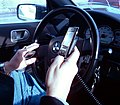Portal:Telephones

A telephone is a telecommunications device that permits two or more users to conduct a conversation when they are too far apart to be easily heard directly. A telephone converts sound, typically and most efficiently the human voice, into electronic signals that are transmitted via cables and other communication channels to another telephone which reproduces the sound to the receiving user. The term is derived from Greek: τῆλε (tēle, far) and φωνή (phōnē, voice), together meaning distant voice. A common short form of the term is phone, which came into use early in the telephone's history.
In 1876, Alexander Graham Bell was the first to be granted a United States patent for a device that produced clearly intelligible replication of the human voice at a second device. This instrument was further developed by many others, and became rapidly indispensable in business, government, and in households. (Full article...)

A mobile phone (or cellphone) is a portable telephone that can make and receive calls over a radio frequency link while the user is moving within a telephone service area, as opposed to a fixed-location phone (landline phone). The radio frequency link establishes a connection to the switching systems of a mobile phone operator, which provides access to the public switched telephone network (PSTN). Modern mobile telephone services use a cellular network architecture, and therefore mobile telephones are called cellphones (or "cell phones") in North America. In addition to telephony, digital mobile phones support a variety of other services, such as text messaging, multimedia messaging, email, Internet access (via LTE, 5G NR or Wi-Fi), short-range wireless communications (infrared, Bluetooth), satellite access (navigation, messaging connectivity), business applications, payments (via NFC), multimedia playback and streaming (radio, television), digital photography, and video games. Mobile phones offering only basic capabilities are known as feature phones (slang: "dumbphones"); mobile phones that offer greatly advanced computing capabilities are referred to as smartphones. (Full article...)
A smartphone (often simply called a phone) is a mobile device that combines the functionality of a traditional mobile phone with advanced computing capabilities. It typically has a touchscreen interface, allowing users to access a wide range of applications and services, such as web browsing, email, and social media, as well as multimedia playback and streaming. Smartphones have built-in cameras, GPS navigation, and support for various communication methods, including voice calls, text messaging, and internet-based messaging apps. (Full article...)
Selected article -
Premium-rate telephone numbers are telephone numbers that charge callers higher price rates for select services, including information and entertainment. A portion of the call fees is paid to the service provider, allowing premium calls to be an additional source of revenue for businesses. Tech support, psychic hotlines, and adult chat lines (e.g. dating and phone sex) are among the most popular kinds of premium-rate phone services. Other services include directory enquiries, weather forecasts, competitions and ratings televoting (especially relating to television shows). Some businesses, e.g. low-cost airlines, and diplomatic missions, such as the US Embassy in London or the UK Embassy in Washington, have also used premium-rate phone numbers for calls from the general public.
Premium calls are typically independent of the caller's area code. These telephone numbers are usually allocated based on a national telephone numbering plan that makes them easily distinguishable from non-premium numbers; telephone companies often offer their customers the option to block calls from these number ranges, and in some jurisdictions, are required by law to offer blocking services.
SMS (texting) also has a feature for premium rate services, however instead of standard telephone numbers, premium-rate texting uses so-called shortcodes, which are 4–6 digit numbers that work only for SMS. (Full article...)Types of phones -
Selected audio -
A busy signal (or busy tone or engaged tone) in telephony is an audible call-progress tone or audible signal to the calling party that indicates failure to complete the requested connection of that particular telephone call. (Full article...)
List articles

- Comparison of smartphones
- List of best-selling mobile phones
- List of countries by number of broadband Internet subscriptions
- List of countries by number of telephone lines in use
- List of countries by smartphone penetration
- List of country calling codes
- List of iPhone models
- List of mobile network operators
- List of mobile phone brands by country
- List of mobile phone generations
- List of telephone operating companies
Related portals
General images -
Selected biography

William Rae Young, Jr. (October 30, 1915 – March 7, 2008) was one of the Bell Labs engineers that invented the cell phone.
The history of cellular phone technology began on December 11, 1947 with a Bell Labs internal memo written by Douglas H. Ring describing the idea of Rae Young of the hexagonal cell concept for a cellular mobile telephone system. (Full article...)Selected images
Topics
Subcategories

More
 |
Here are some tasks awaiting attention:
|
Telephones in the news
No recent news
Associated Wikimedia
The following Wikimedia Foundation sister projects provide more on this subject:
-
Commons
Free media repository -
Wikibooks
Free textbooks and manuals -
Wikidata
Free knowledge base -
Wikinews
Free-content news -
Wikiquote
Collection of quotations -
Wikisource
Free-content library -
Wikiversity
Free learning tools -
Wiktionary
Dictionary and thesaurus














































































































